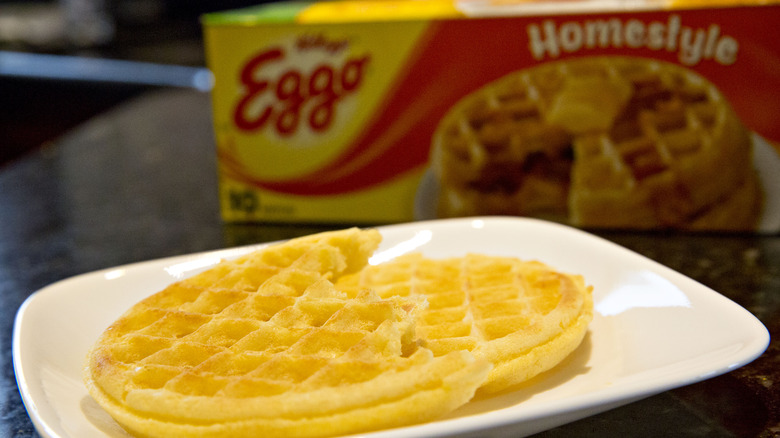You Won't Guess What Condiment Eggo Made Before Waffles
Waffles for breakfast are a delicacy like no other. Make a big ol' plate of waffles with a dab of butter and a drizzle of some maple syrup first thing in the morning, and your day is already off to a great start. There are a couple key methods of traditional waffle making, including mixing up your own fresh batter and baking it in an iron — or simply popping a few frozen cakes in the toaster. If you prefer the latter, you're likely familiar with the brand Eggo.
Eggo waffles were invented by Frank Dorsa in 1935 in San Jose, California, according to the brand's official website. He often came up with innovations in an effort to make everyday tasks more convenient for people. This philosophy eventually led him to the idea of flash freezing waffles so they could be quickly reheated for enjoyment, saving time, energy, and money for families. But did you know that Eggo didn't actually originate as a waffle brand? The company initially made a totally different product. (Hint: The answer is more evident than you may think.)
Eggo started as a mayonnaise brand
That's right! Before Eggo was known for its boxes of frozen waffles and the "L'Eggo My Eggo" catchphrase, the company created their own special recipe for a popular pantry staple during the Great Depression. Frank Dorsa and his brothers, Anthony and Sam, whipped up batches of tasty mayo in their parents' basement and sold it to hungry San Joseans, according to Mental Floss. Mayonnaise is a condiment made with oil and eggs, hence the brand name that has stuck in consumers' minds for nearly a century: Eggo.
An advertisement in the April 22, 1940 issue of San Jose News even promotes Eggo mayonnaise, claiming the condiment would "add zest and a delicious, better taste to every salad you serve," noting that it was made with "100% fresh ranch eggs, triple refined vegetable oil, highest quality spices, and pure vinegar." The company eventually sold both mayonnaise and waffle mix throughout California — one of which clearly enjoyed better long-term success.

